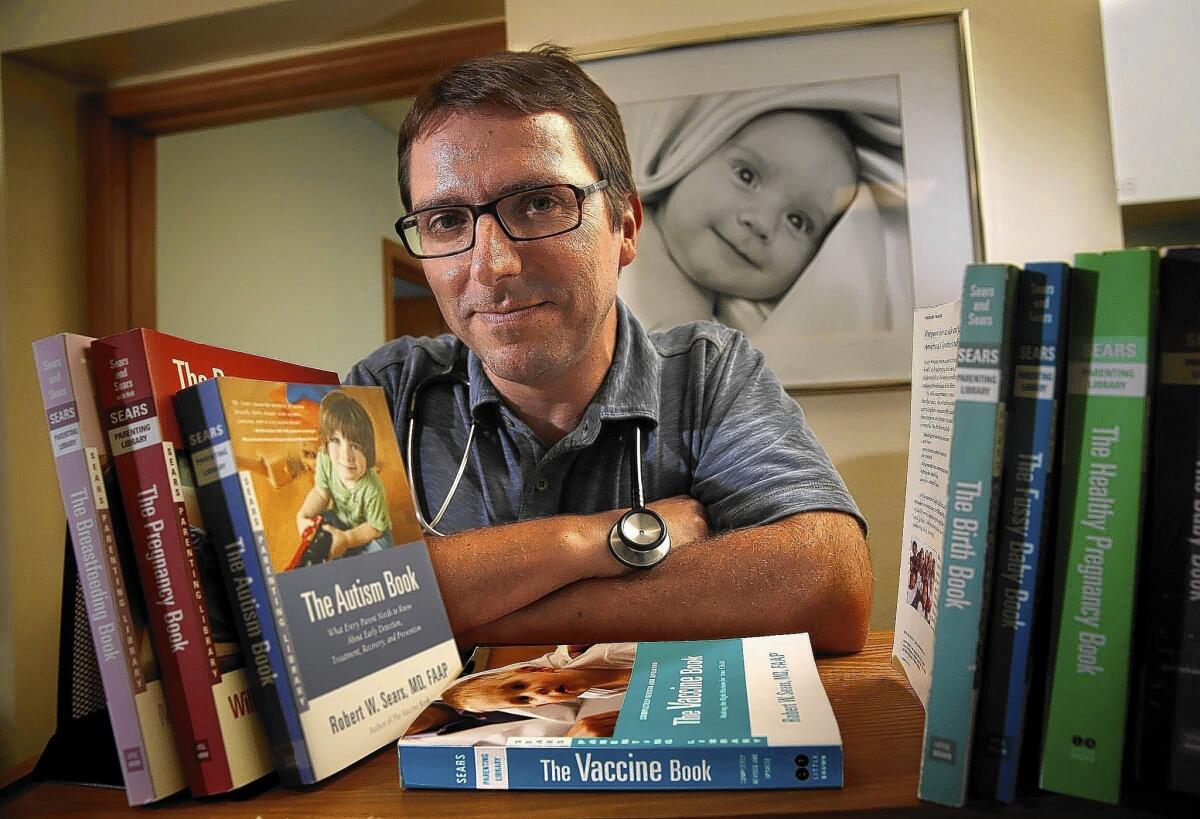Vaccination controversy swirls around O.C.’s ‘Dr. Bob’

- Share via
Maureen Viereck arrived at Dr. Bob Sears’ Dana Point office with her 4-year-old son, having driven from San Diego to meet the pediatrician and discuss her concerns about vaccines.
She worries that immunizations cause health problems, and friends had told her about Sears and his book.
“I’m vegan,” she said, and in her circle, word of Sears “sort of traveled through the grapevine.”
That same day, Karissa and Richard Sandoval of Corona showed up at the pediatrician’s office with 2-month-old twins Andrew and William.
“You don’t find too many alternative-friendly doctors where we live,” Karissa said.
In the seven years since “The Vaccine Book: Making the Right Decision for Your Child” was published, it has sold more than 250,000 copies and Sears has become a celebrity among parents who see danger in immunization.
While the vast majority of physicians are troubled by the anti-vaccination movement, Sears, 45, lends a sympathetic ear. About half his patients forgo vaccines altogether. To others, he offers “Dr. Bob’s” alternative and selective vaccination schedules, which delay or eliminate certain immunizations.
At a conference this year in Rancho Mirage, Sears told a roomful of pregnant women, new mothers and healthcare professionals that vaccines work well and are responsible for the nation’s low disease rate, something parents who don’t want to immunize can take advantage of.
“I do think the disease danger is low enough where I think you can safely raise an unvaccinated child in today’s society,” he said. “It may not be good for the public health. But … for your individual child, I think it is a safe enough choice.”
That approach frustrates infectious-disease experts, who in recent years have found themselves combating some celebrities’ anti-vaccination beliefs.
“We eliminated endemic measles in the U.S. in 2000. It’s now 2014 and we’re at 400 cases. Why?” Dr. Paul Offit, chief of infectious diseases at Children’s Hospital of Philadelphia, said in an interview in June. The number of cases has since risen to nearly 600. “Because people listen to Bob Sears. And, frankly, I blame him far more than I do the Jenny McCarthys of this world. Because he’s a doctor. And he should know more.”
::
California parents are choosing to forgo vaccinating their kindergarten-age children at twice the rate they did seven years ago, a fact public health experts said is contributing to the re-emergence of measles and could lead to outbreaks of other diseases.
In a concept known as herd immunity, communities must be vaccinated at a high rate to avoid widespread disease outbreaks. For measles and whooping cough, at least 92% of a community needs to be immune, experts say.
In the Capistrano Unified School District, which includes the upscale South Orange County neighborhood where Sears’ office is located, 9.5% of kindergartners had personal-belief exemptions on file last fall, compared to a state average of 3.1%. At some individual schools, as many as 60% of students had such exemptions.
Just a little farther north, in Santa Ana Unified, only 0.2% of kindergartners had exemptions on file, according to a Times analysis of state records.
The 22 measles cases reported this year in Orange County, said Dr. Matt Zahn of the county’s health agency, appear to have started with people who traveled outside the country and then spread to several unvaccinated children.
“Dr. Sears doesn’t regard himself as a vaccine refuser. He regards himself as someone who advocates a more gradual immunization process,” Zahn said. “I think this situation illustrates the dangers inherent to that.”
In an interview, Sears defended his philosophy of offering alternative immunization schedules, saying they “allow parents to get vaccinations in a way they’re more comfortable” with.
“If they’re given no option, I would say some of the patients are going to choose not to do them at all.”
He has also argued that public health officials and the media can exaggerate the dangers of outbreaks.
When measles cases began showing up in Orange County this year, Sears asked on his Facebook page why people were panicking. “Here’s one reason: the ^$#@*&%&*$# media,” he wrote.
::
“The Vaccine Book” is part of the Sears Parenting Library, which includes works by Sears’ father. Dr. William Sears — or “Dr. Bill” — is a frequent TV show guest who advocates for breast feeding, bed sharing and other attachment parenting techniques.
Robert Sears became interested in vaccines as a medical student after reading “DPT: A Shot in the Dark,” a 1985 book that argued that the whooping cough vaccine was dangerous. (The makeup of the vaccine has since been changed.) Sears said the book, which helped spark a backlash against vaccines, exposed him to ideas he wasn’t hearing in school.
When he started practicing in Orange County in 1998, he began offering patients a delayed vaccination schedule. In “The Vaccine Book,” Sears lays out his alternatives — and what he says are the risks and benefits of inoculations.
For example, he recommends delaying the start of the varicella vaccination for chickenpox from age 1 until 2, the polio vaccination from 2 months to 9 months, and the hepatitis A vaccination from 1 until 7. He also advises parents concerned about autism to delay the measles vaccination until their children are 4 or 5.
Sears’ book offers his schedules alongside one recommended by the American Academy of Pediatrics and the Centers for Disease Control and Prevention. Dr. Carrie Byington, chairwoman of the academy’s committee on infectious diseases, said that Sears’ recommendations are “not based in science.”
“The approved schedule in the United States is the schedule that has been shown to be safe and effective,” she said. “The Institute of Medicine, as well as many, many studies, have confirmed this again and again.”
A 2009 article in the journal Pediatrics by Offit and Charlotte A. Moser, assistant director of the vaccine education center at Children’s Hospital of Philadelphia, criticized Sears’ “misrepresentation of vaccine science.”
His book, they said, underplays the dangers of vaccine-preventable diseases, wrongly suggests that vaccines don’t receive in-depth testing and research, and confuses reported vaccine-related side effects with proven effects.
“Unfortunately, Sears, who wants parents to make informed decisions, has written a book that will largely misinform them,” they wrote.
In a response posted on his website, Sears called the article misleading and said the authors wrongly characterized the book as anti-vaccine.
“I believe that vaccine books that only show one side of the issue aren’t an effective educational tool,” he wrote.
While concern about vaccines often is linked to autism — a connection thoroughly debunked by scientists — many parents say they are worried about the sheer number of recommended inoculations.
California requires kindergartners to be immunized against nine diseases, while the CDC recommends young children be vaccinated against 14 — some of which require several doses administered during separate doctor’s visits. For parents who are overwhelmed by those numbers and have little direct experience with infectious diseases like measles, Sears’ approach can be appealing.
Natacha Bangura, who drove from Pacoima to hear Sears’ speech in Rancho Mirage, said she’d chosen to delay some vaccinations for her young children.
“It’s not really research-based,” she said. “It just feels better and safer to me.”
paloma.esquivel@latimes.com
Twitter: @palomaesquivel
More to Read
Get the Latinx Files newsletter
Stories that capture the multitudes within the American Latinx community.
You may occasionally receive promotional content from the Los Angeles Times.







